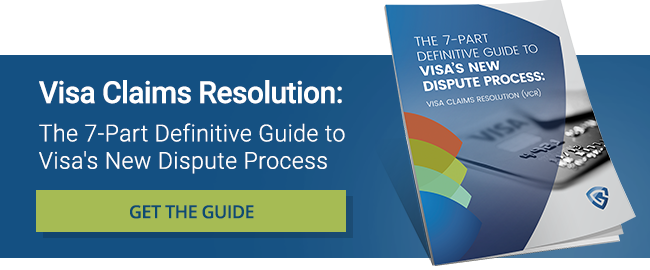Chargeback Rules: What Merchants Need to Know
Chargebacks present a major problem for merchants. Unfortunately, the continually changing chargeback rules and regulations surrounding chargebacks can be confusing.
How chargebacks work
If your small business accepts credit card payments, you’ve likely already dealt with unfair chargebacks. A chargeback occurs when a customer contacts their credit card issuer to contest a charge. If the customer’s bank deems the argument valid, the customer will be repaid for the transaction – through your company’s bank account. In addition to the loss of the customer’s previously cleared credit card payment, you’ll also owe a processing fee that can range from nominal to exorbitant.
What makes a valid dispute?
There are a number of reasons why a credit card company would consider a customer’s chargeback to be valid. For example, if the customer was a victim of identity theft and/or had their credit card stolen and didn’t personally make the transactions, this is a reasonable basis for dispute.
Customers can also personally dispute charges. Because of the persistent mentality that “the customer is always right,” credit card issuers will often acquiesce if a customer claims that an item they ordered was not delivered, they were incorrectly billed, or they don’t recognize the merchant on their credit card statement.
Issuers tend to want to keep their customers – which often means that merchants suffer the consequences of friendly fraud. This is especially problematic for ecommerce merchants. The rise of online transactions correlates significantly with a rise in chargeback disputes.
What merchants can do
In order to respond in a timely and cohesive manner as a merchant, you’ll need to carefully tailor your argument according to each company’s rules and regulations. Each card network has a number of different moving parts that you’ll have to contend with as a merchant – and many of them are constantly being updated.
What are the current rules?
Every credit card processor has its own protocol to follow. It’s usually much easier to resolve issues with card present purchases, which means the card was physically swiped in person during the transaction. Merchants can safeguard themselves by ensuring expiration dates and security codes match up at the time of purchase. By safely entering this information into the appropriate point of sale system, merchants provide themselves with necessary documentation ahead of time, should an issue arise.
Card not-present purchases are a bit more complicated. Some credit card processors require prior permission before you’re allowed to process card not-present purchases, which include transactions completed either online or over the phone. A bank may require merchants to document additional information to protect against identity theft. Merchants could potentially need to keep track of data such as the customer’s IP address or digital signature.
Visa and MasterCard both have programs in place to add an extra layer of security to online transactions – respectively, Verified By Visa and MasterCard Secure Code. By implementing one of these for an ecommerce transaction, merchants can allow customers to register an extra password to protect themselves.
You’ll need to find out if your processor requires enrollment in these security programs as well as what other documentation you need to have on file in case of a problem. For example, you might need to keep a tab of delivery confirmation notices to present if a customer says their order never arrived.
Latest Chargeback Changes
Each credit card conglomerate has its own regulations, all of which are updated at different times. Here’s the latest information on changing chargeback rules from the “big three”: MasterCard, Visa, and American Express.
- MasterCard last updated its policies in October of 2014. The previous manual was published only a few months prior, in April 2014. Updates included both major and minor edits. For example, certain sections were deleted entirely, while other content was added throughout. There has been no recent news regarding updates to the MasterCard chargeback policy. As such, this is the current document that reflects all rules and regulations MasterCard merchants must contend with.
- Visa will make major changes to its Core Rules document in January of 2016. The biggest update will be a streamlining of its chargeback monitoring programs, which currently exist in three tiers. The Global Merchant Chargeback Monitoring Program, U.S. Merchant Chargeback Monitoring Program, and the High Brand Risk Chargeback Monitoring Program will converge into a singular unit: the Visa Chargeback Monitoring Program. In addition to unifying the chargeback monitoring process, Visa also plans to consolidate its fraud monitoring programs into one: the Visa Fraud Monitoring Program.
- American Express edits its merchant regulations document twice per year – in April and October. Any changes to the chargeback policy are contained within this document, which deals with every component of being an American Express merchant. It’s a comprehensive manual that includes everything from tools to tips to best practices, in addition to official protocol for conducting business. This vast amount of information can be overwhelming to process, especially when chargebacks make up only a small section.
While this may seem like a lot to take in, all of this information is critical for merchants to stay current on their card networks’ policies and expectations.
Keeping Track of Chargeback Rules
With so many different and constantly changing chargeback rules – and so many networks operating differently – the best way to prepare your company for a potential dispute is to manually consult each company’s policies. Unfortunately, this is often easier said than done. Because rules are subject to updates, and because different networks make changes at different times, it can be hard to keep track. These issues require careful monitoring; if you fail to keep tabs, you could land yourself in a lot of trouble.
Thanks for following the Chargeback Gurus blog. Feel free to submit topic suggestions, questions or requests for advice to: win@chargebackgurus.com



